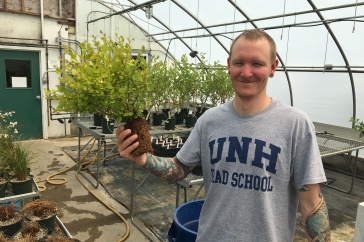
One of the most challenging aspects of any scientist's work is successfully explaining to lay audiences the details and importance of complex research, but several College of Life Sciences and Agriculture (COLSA) graduate students excelled at doing just that — and in under three minutes.
Lesley Atwood, a doctoral candidate in agroecology, was the grand prize winner and people’s choice winner in UNH’s first 3 Minute Thesis (3MT) competition, while Tao Huang, a graduate student stuyding natural resources, and Devon O’Rourke, a graduate student in molecular biology, were both finalists.
Sponsored by the UNH Graduate School, the 3MT pilot program was introduced in 2016 with 18 doctoral students participating. UNH’s 3MT event is part of an international academic competition that challenges students to describe their research within three minutes to a general audience. Participants are judged on comprehension, content, engagement and communication.
All three credit UNH, COLSA and their advisors for opprotunities, guidance and mentoring not only in preparation for the 3MT competition but throughout their graduate studies.

3MT, which celebrates the discoveries made by student researchers and encourages their skill in communicating the importance of research to the broader community, will launch as a full program at UNH in 2017.
Cari Moorhead, the Graduate School’s interim dean, explains that by design, 3MT forces graduate students to consolidate their ideas and concisely explain their research, its context and their findings to a broad audience.
“We know that the strong communication skills required to participate in the 3MT are essential for today’s graduates,” Moorhead explains. “We are so proud to offer the 3MT as part of our professional development portfolio.”
Atwood, who took first place in the inaugural event, studies the interface between agriculture, soil ecology and community ecology.
“There is an art to communicating very technical research to broad audiences. The most challenging part of the 3MT competition was undoubtedly figuring out how best to communicate the technical aspects of research to people outside of my field,” Atwood explains.
O’Rourke, a former high school teacher, agrees. “3MT is a competition in storytelling, not in research. You have three minutes to complete the essential elements of any story arc: introducing the major players, building conflict and then addressing some resolution.”
Atwood presented her talk to three different audiences to gather feedback and prepare for 3MT. “In the end, I feel like the talk provided enough details for the audience to know what I did and why they should care about the use of pesticide seed treatments.”

Huang, a COLSA graduate student whose research focuses on water quality, decided to take part in 3MT because, as he explains, “Some scientists struggle in communication, especially in distilling their message. 3MT is a great opportunity to focus a lot on re-crafting the language and getting rid of jargon.”
The limited time, he says, was the biggest challenge: “You probably have only less than one minute to talk about the research background. Important findings need to be condensed into one minute, and you need to save enough time to give the take-home message.”
Huang, who was born in a small town in Taiwan surrounded by nature, says he realized there are many places in the world with significant environmental issues where “water quality might be the most important one. We need to understand the underlying processes to solve these issues.”
Graduate study at COLSA has been the right move, he explains. “UNH is one of the best places to study environments."
Want to learn more? Watch Lesley Atwood's 3MT entry. Watch Devon O'Rourke's 3MT entry. Watch Tao Huang's 3MT entry.
-
Written By:
Lori Tyler Gula, PhD | NH Agricultural Experiment Station | lori.gula@unh.edu | 603-862-1452
















































